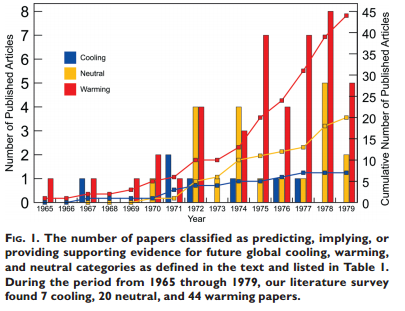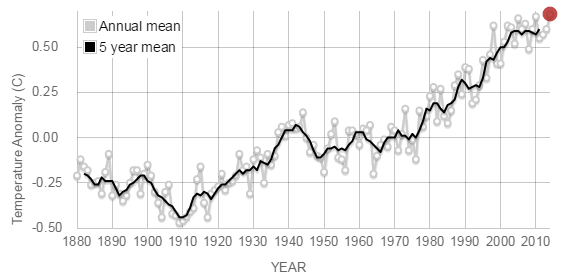Sen. Ted Cruz cited a 1975 Newsweek article on “global cooling” to question the evidence of global warming, and in the process made several incorrect and unsubstantiated claims.
- The Newsweek story, which did warn of a “cooling world,” has been criticized and largely debunked — by its own author. Cruz’s claim that “advocates of global cooling suddenly shifted to global warming” ignores the fact that there was no scientific consensus in the 1970s about global cooling.
- Cruz said that “satellite data demonstrate that there has been no significant warming whatsoever for 17 years.” This is misleading. Though the trend line in recent years has been relatively flat, Cruz cherry-picks a particularly warm year (1998) to deny the clear longer term warming trend. There have now been 360 consecutive months when the global temperature was above the 20th century average.
- Cruz compared “global warming alarmists” to “flat-Earthers” and himself to Galileo, saying “this heretic named Galileo was branded a denier” for insisting the Earth was round. This is wrong. Galileo’s troubles with the church stemmed from his belief that the Earth orbits the Sun. The fact that the planet is round was accepted before Galileo was born.
In an interview with the Texas Tribune (at the 14:24 mark), Cruz, who recently announced his candidacy for president, told reporter Jay Root that the 1975 global cooling story in Newsweek is evidence that “alarmists” simply want the government to control the energy sector.
Cruz, March 24: I read this morning a Newsweek article from the 1970s talking about global cooling. And it said the science is clear, it is overwhelming, we are in a major cooling period and it’s going to cause enormous problems worldwide. … Now, the data proved to be not backing up that theory. So then all the advocates of global cooling suddenly shifted to global warming.
The article in question was a single-page story published on April 28, 1975, by journalist Peter Gwynne. It did indeed paint an ominous picture of a cooling world, with particular concern regarding reductions to crop yields with cooler temperatures. The article, however, was criticized decades later, in May 2014, by its author.
 “Here I must admit mea culpa,” Gwynne wrote last year for Inside Science. “In retrospect, I was over-enthusiastic in parts of my Newsweek article.” He specifically cited both the scare over food production declines “that had scant research to back it,” and a connection between cooling and increases in tornado frequency that also was unsupported by evidence.
“Here I must admit mea culpa,” Gwynne wrote last year for Inside Science. “In retrospect, I was over-enthusiastic in parts of my Newsweek article.” He specifically cited both the scare over food production declines “that had scant research to back it,” and a connection between cooling and increases in tornado frequency that also was unsupported by evidence.
His primary point was simply that science progresses as time passes; though there were some in 1975 who believed cooling temperatures were on the horizon, climate science has improved dramatically since then. “Those that reject climate science ignore the fact that, like other fields, climatology has evolved since 1975,” Gwynne wrote. “The certainty that our atmosphere is indeed warming stems from a series of rigorous observations and theoretical concepts that fit into computer models and an overall framework outlining the nature of Earth’s climate.”
According to a 2010 study published in the Proceedings of the National Academy of Sciences, “97-98% of the climate researchers most actively publishing in the field” support the primary findings of the Intergovernmental Panel on Climate Change: “that it is ‘very likely’ that anthropogenic [human-caused] greenhouse gases have been responsible for ‘most’ of the ‘unequivocal’ warming of the Earth’s average global temperature.”
In the 1970s, though, scientists had not yet determined the relative impacts of two factors on climate: greenhouse gases, such as carbon dioxide, and aerosols, such as those that are spewed out by volcanic eruptions and burning of forests. Some papers in the early part of the decade predicted that increasing aerosol emissions could lower temperatures enough to trigger an ice age, but these conclusions were disputed. By the late 1970s, research had established that the warming associated with greenhouse gases was dominant over the cooling effect of aerosols.
And in fact, reviews of research from that era have shown that even around the time of Newsweek’s 1975 article, a warming climate was of more concern than a cooling one. A study published in the Bulletin of the American Meteorological Society by climate scientists and a journalist in 2008 said there was no scientific consensus in the 1970s that the world was cooling.
Bulletin of the AMS, September 2008: An enduring popular myth suggests that in the 1970s the climate science community was predicting “global cooling” and an “imminent” ice age, an observation frequently used by those who would undermine what climate scientists say today about the prospect of global warming. A review of the literature suggests that, on the contrary, greenhouse warming even then dominated scientists’ thinking as being one of the most important forces shaping Earth’s climate on human time scales.

The survey of the peer-reviewed literature between 1965 and 1979 found only seven papers “indicating” global cooling compared with 44 papers indicating warming (see chart).
The researchers pointed to a 1979 report from the National Research Council, part of the National Academies, that warned about the dangers of continuing to emit carbon dioxide by burning fossil fuels and associated warming. “A wait-and-see policy may mean waiting until it is too late,” the report noted. The Bulletin of the AMS paper concluded: “Clearly, if a national report in the 1970s advocates urgent action to address global warming, then the scientific consensus of the 1970s was not global cooling.”
The 17-Year Cherry-Pick
Cruz also said there has been “no significant warming” in the last 17 years, repeating a claim often made by those who dispute evidence of climate change:
Cruz, March 24: The satellite data demonstrate that there has been no significant warming whatsoever for 17 years. Now that’s a real problem for the global warming alarmists because all of the computer models on which this whole issue is based predicted significant warming, and yet the satellite data show it ain’t happening.
Cruz cherry-picks data to arrive at a spurious conclusion.
Seventeen years ago was 1998, one of the hottest years since recording began. That year was unusually warm thanks in part to a very strong El Niño event, an ocean-atmospheric phenomenon marked by warm ocean surface temperatures in the Pacific. That year, the average global temperature was 0.62 degrees Celsius above the 20th century average, according to NASA (the agency that produces that “satellite data” Cruz mentioned). In 2014, considered by several research organizations including NOAA and NASA as the most likely candidate for warmest on record, the temperature was 0.68 degrees above average, suggesting very little warming between those two data points.
It would be just as easy, however, to pick out much cooler years as a starting point to show a sharp increase in temperatures. Starting one year earlier or later — at 1997 (0.46 degrees above the 20th century average) or 1999 (0.41 degrees) — would yield between one-fifth and one-quarter of a degree of warming. This would represent as much as 31 percent of all warming the world has seen since 1880, when record keeping began.
Choosing 1997 or 1999 as a starting point, however, would be just as misleading as choosing 1998.
Climate researchers look to longer term trends to determine warming, as there is too much natural variability within any given year. And that long-term trend is unequivocal (see NASA chart below): The world has now gone 30 consecutive years — 360 straight months — where every month has been above the 20th century average, according to the National Oceanic and Atmospheric Administration. Though it may be difficult for many who live in the northeastern U.S. to believe, this winter (December – February) was globally the warmest ever recorded. Nine of the 10 hottest years on record have occurred since 2000, with 1998 the only exception.
Cruz said “[i]f you look at global warming alarmists, they don’t like to look at the actual facts and the data.” The facts and data actually support the scientific consensus on global warming.

Update, June 5: Though the IPCC concluded in 2012 that a “hiatus” in warming occurred from around 1998 through recent years, a new report published in the journal Science by National Oceanographic and Atmospheric Administration scientists has called that conclusion “no longer valid.”
The researchers updated temperature data sets to better reflect the readings taken from ships and floating buoys, as well as from land-based temperature stations. They found that the warming trend from 2000 to 2014 was 0.116 degrees C per decade – a number that is “virtually indistinguishable” from the earlier and longer period from 1950 through 1999 (0.113 degrees C per decade). Even if they shifted the more recent trend to 1998 through 2014, which features a very warm starting year, the trend was similar — 0.106 degrees C per decade.
In other words, as the study’s lead author told the Associated Press, “the reality is that there is no hiatus.” The world has continued to warm in recent years, at about the same rate as in decades prior.
Galileo and Flat-Earthers
Cruz also compared “global warming alarmists” to “flat-Earthers,” and mistakenly cited the Renaissance-era scientist Galileo in connection to that issue:
Cruz, March 24: On the global warming alarmists, anyone who actually points to the evidence that disproves their apocalyptical [sic] claims, they don’t engage in reasoned debate. What do they do? They scream, “You’re a denier.” They brand you a heretic. You know, it is, today the global warming alarmists are the equivalent of the flat-Earthers. You know, it used to be, it is accepted scientific wisdom the Earth is flat, and this heretic named Galileo was branded a denier.
Galileo’s struggle against the Catholic Church had nothing to do with debate over the shape of the planet. In fact, he was persecuted for supporting the idea of a Copernican system, which posited that the sun was the center of the universe and the Earth revolved around it. At the time of this struggle with the church, in the early 17th century, it had long been accepted that the planet is in fact round. Explorer Ferdinand Magellan’s crew completed the first circumnavigation of the globe in 1522 — 42 years before Galileo was born.
Whether he meant flat-Earthers or geocentrists, Cruz is wrong to compare those he casts as “global warming alarmists” to those who denied science. Galileo used the most modern of scientific technology and techniques, which he himself helped develop, assessed the available evidence, and came to conclusions about the world. Modern science, including climate science, is engaged in exactly that process today.
Editor’s Note: SciCheck is made possible by a grant from the Stanton Foundation.
– Dave Levitan